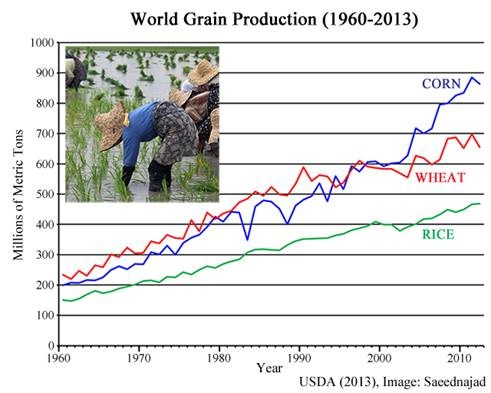daveman
Diamond Member
Global Warmists Preach Hunger, But Crops Just Grow And Grow
How often have warmists peddled the starvation scare?
Some examples:
Mark Rosegrant, International Food Policy Research Institute , February 2013:
Professor Ian Lowe, president of the Australian Conservation Foundation, December 2012:
German Advisory Council on Global Change, 2007:
David Lobell, Stanford University, 2008:
Elizabeth Ainsworth, University of Illinois, Urbana-Champaign, 2008:
Green activist Cameron Scott :
The Age, 2013:
I think the warmists were wrong again:

Some examples:
Mark Rosegrant, International Food Policy Research Institute , February 2013:
FRAN Kelly: Dramatic falls in staple crop production, and a jump in malnutrition are predicted across the Asia Pacific in coming decades due to climate change. . . (Dr Mark Rosegrant) . . . according to your research which crops would be most affected?
Rosegrant: Were finding that the key staples of rice, wheat and maize are going to have very large declines through most of Asiaanywhere from 15 to 25 per cent compared to a no-climate-change scenario.
Rosegrant: Were finding that the key staples of rice, wheat and maize are going to have very large declines through most of Asiaanywhere from 15 to 25 per cent compared to a no-climate-change scenario.
Professor Ian Lowe, president of the Australian Conservation Foundation, December 2012:
For example, the United Nations food agency has warned that it will be less and less likely that we can feed the human population if climate change continues on its present trajectory.
The Intergovernmental Panel on Climate Change, 2001:
Acute water shortage conditions combined with thermal stress should adversely affect wheat and, more severely, rice productivity in India even under the positive effects of elevated CO2 in the future.
German Advisory Council on Global Change, 2007:
The Climate Change as a Security Risk report by the German Advisory Council on Global Change called on governments meeting this week at the climate change conference in Bali to adopt deep emissions cuts to avert disaster
. According to the report
India, Pakistan and Bangladesh could see falls in wheat and rice yields as the monsoon changes.
David Lobell, Stanford University, 2008:
Impoverished farmers in South Asia and southern Africa could face growing food shortages due to climate change within just 20 years, a new study says
The majority of the worlds one billion poor depend on agriculture for their livelihoods, said the lead author of the new study, David Lobell of Stanford University.
Unfortunately, agriculture is also the human enterprise most vulnerable to changes in climate.
The majority of the worlds one billion poor depend on agriculture for their livelihoods, said the lead author of the new study, David Lobell of Stanford University.
Unfortunately, agriculture is also the human enterprise most vulnerable to changes in climate.
Elizabeth Ainsworth, University of Illinois, Urbana-Champaign, 2008:
Rice is arguably the worlds most important food source and helps feed about half the globes people. But yields in many areas will drop as the globe warms in future years, a review of studies on rice and climate change suggests.
when the evidence from some 80 different studies is combined, the outlook is bleak, says Elizabeth Ainsworth of the University of Illinois, Urbana-Champaign.
when the evidence from some 80 different studies is combined, the outlook is bleak, says Elizabeth Ainsworth of the University of Illinois, Urbana-Champaign.
Green activist Cameron Scott :
Most major political shifts are caused at least in part by economic pressures. Food prices are now at an all-time high. Those prices have, according to a wide range of analysts, contributed to the political revolts first in Tunisia and now in Egypt
But heres the kicker: Food prices arent just some arbitrary economic statistic. They measure (inversely) the planets success at sustaining its human population. And right now, its not doing so well. The reason? Erratic weather spurred by climate change.
The Age, 2013:
Imagine India in 2033. It has overtaken China as the most populous nation. Yet with 1.5 billion citizens to feed, its been three years since the last monsoon. Without rain, crops die and people starve.
The seeds of conflict take root.
This is one of the scenarios Joachim Schellnhuber, director of the Potsdam Institute for Climate Impact Research, presented today to members of the United Nations Security Council in New York to show the connection between climate change and global security challenges.
The seeds of conflict take root.
This is one of the scenarios Joachim Schellnhuber, director of the Potsdam Institute for Climate Impact Research, presented today to members of the United Nations Security Council in New York to show the connection between climate change and global security challenges.
I think the warmists were wrong again:



